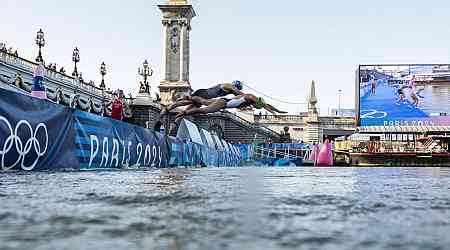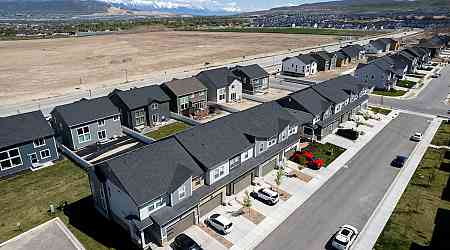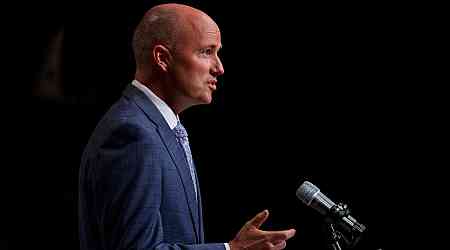
PARIS — Olympic open water swimmers trained in the long-polluted Seine River on Wednesday after Paris organizers determined it was safe to dive in.
A two-hour training session was held on a cool, cloudy morning, providing the only chance for swimmers to familiarize themselves with the picturesque course through the middle of the French capital.
[time-brightcove not-tgx=”true”]Dozens of swimmers — from 2016 Olympic champion Sharon van Rouwendaal to Ireland’s Daniel Wiffen, competing in open water for the first time — dove into the Seine one day before the women’s 10-kilometer marathon event. The men’s race is set for Friday.
Before diving in, several swimmers checked out the conditions from the famed Pont Alexandre III, adorned with golden statues and overlooking the starting buoy and finishing chute.
“I think if anyone’s saying they’re not concerned at all, they’re probably lying,” Austrian swimmer Felix Auboeck said. “I am concerned. I just hope and trust the organization in the sense that they let us in when it’s safe enough to do so. But, of course, you’re concerned because no one wants to get ill or sick.”
Then again, Auboeck can see the appeal of swimming in the Seine at the course that has the Eiffel Tower, the gold-domed Invalides, and other stunning Paris landmarks for a backdrop.
“It is super exciting that this is scenery where we are racing,” he said. “That’s probably like the best thing we can do for the sport.”
World Aquatics canceled a test run Tuesday because of concerns over fluctuating bacteria levels in the waterway. Despite massive efforts to clear the Seine, water quality has been a constant concern throughout the Games.
But officials expressed confidence that both races will be held without any issues, especially with a favorable forecast that calls for sunny skies in the afternoon and little chance of rain.
Open water swimmers do most of their training in the controlled conditions of a pool. While concerns about bacteria levels in the Seine might have prompted some to skip the training session and limit their time in the river to the actual event, it appeared that a majority took advantage of the training session — especially to check out the strong current that has also raised concerns.
The current has been measured at 2-3 mph, a significant challenge when going upstream on the six-lap course.
“The current is just going to be another challenge,” Auboeck said. “It’s going to be very, very different to what we have seen before. I wish there would have been more practice races with a current like this. That would have been good.”
Triathlon events have already been held in the river, though the schedule was upended by the readings that are taken daily of the water quality.
Now, it’s time for open water, which at least has a backup plan in place if the Seine is determined to be unsafe. The races would be shifted to Vaires-sur-Marne Nautical Stadium, site of the rowing and canoeing events.
The triathlon mixed relay event was held Monday. World Triathlon released data Tuesday showing the levels of fecal bacteria E. coli and enterococci were within acceptable levels for the length of the triathlon relay course during those swims.
The marathon swims take place on longer portions of the river and will start and finish at the Pont Alexandre III. Marathon swimmers do six laps on the 1.67-kilometer (1 mile) course for a total of 10 kilometers (6.2 miles.)
Paris Mayor Anne Hidalgo, who took a highly publicized swim in the Seine in July to allay fears about water quality ahead of the Olympics, expressed confidence in the preparations.
“There’s been a clear improvement of the weather these past few days,” she said. “So I’m really proud and happy and to all those who want to continue saying it’s impossible to depollute a river, I tell them, ’Yes it’s possible, we did it.’”
With a few exceptions, swimming in the Seine has been prohibited since 1923 because the water has been too toxic.
Paris undertook an ambitious plan, including 1.4 billion euros ($1.5 billion) in infrastructure improvements to ensure that some swimming events could be held in the river. That included the construction of a giant basin to capture excess rainwater and keep wastewater from flowing into the river, renovating sewer infrastructure and upgrading wastewater treatment plants.
Four triathletes — of the more than 100 who competed in the men’s and women’s individual races last week — became sick in the following days, though it’s unclear whether the water was to blame.
Most strains of E. coli and enterococci are harmless, and some live in the intestines of healthy people and animals. But others are dangerous and even a mouthful of contaminated water can cause infections in the urinary tract or intestines.



























